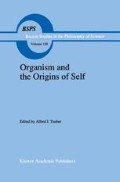Abstract
Foucault [1] full circle, not based on the rectilinear frame of reference of a painting, mirror, house, or book, and with neither “inside” nor “outside” but according to the single surface of a Moebius strip. This is not the classical Cartesian model of self, with a vital ensouled res cogitans surrounded by that predictable world of Newtonian mechanisms of the res extensa; it is closer to Maturana and Varela’s conception of autopoiesis, a completely self-making, self-referring, tautologically delimited entity at the various levels of cell, organism, and cognition [2]. It would be premature to accuse us therefore of a debilitating biomysticism, of pandering to deconstructive fashion, or, indeed, of fomenting an academic “lunacy” or “criminality” that merits ostracism from scientific society, smoothly sealed by peer review and by the standards of what Fleck calls a “thought collective” [3]. Nor would it be timely to label and dismiss us as antirational or solipsist.
Speeches and books were assigned real authors, other than mythical or important religious figures, only when the author became subject to punishment and to the extent that his discourse was considered transgressive.
Access this chapter
Tax calculation will be finalised at checkout
Purchases are for personal use only
Preview
Unable to display preview. Download preview PDF.
References
Foucault, M., 1977. What is an author? In Language, Counter-Memory and Practise: Selected Essays and Interviews. Bouchard, D.F, ed. Cornell University Press, Ithaca, New York. p. 124.
Maturana, H.R., and Varela, F.J., 1973. Autopoiesis: The organization of the living. In Autopoiesis and Cognition. Maturana, H.R., and Varela, F.J., eds., 1980. D. Reidel, Boston.
Fleck, L., 1979. Genesis and Development of a Scientific Fact. University of Chicago Press, Chicago.
Habermas, J., 1987. The Philosophical Discourse of Modernity. Translated by Frederick Lawrence. MIT Press, Cambridge, Mass., p. 137.
Leenhardt, M., 1979. Do Kamo (translated by Gluati, B.M.). University of Chicago, Chicago, p. 22.
Snell, B., 1960. The Discovery of the Mind (translated by T.C. Rosenmeyer). Harper Torchbooks, New York, p. 8.
Elias, N., 1978. The Civilizing Process: The History of Manners (translated by E. Jephcott). Urizen Books, New York, pp. 252–253.
Lacan, J., 1977. The mirror stage as formative in the function of the I. In Écrites: A Selection (translated by A. Sheridan). New York, W.W. Norton, pp. 1–7.
Sagan, D., 1990. What Narcissus saw: The Oceanic “I”/“eye”. In Speculations: The Reality Club 1. Brockman, J., ed. Prentice Hall Press, NY pp. 245–266.
Sagan, D., 1990. Biospheres: Metamorphosis of Planet Earth. McGraw-Hill, New York
Huxley, J., 1912. The Individual in the Animal Kingdom. G.P. Putnam and Sons, New York, p. 125.
Dawkins, R., 1982. The Extended Phenotype: The Gene as the Unit of Expression. Oxford, W.H. Freeman and Co.
Dobell, C., 1913. Observations on the life-history of Cienkowski’s “Arachnula.” Arch. Protistenkund. 31: 317–353.
Wheery, W.B., 1913. Studies on the biology of an amoeba of the limax group. Vahlkampfia sp. No. I. Arch. Protistenkund. 31: 77–94.
Margulis, L., Enzien, M., and H.I. McKhann, 1990. Revival of Dobell’s “chromidia” hypothesis: Chromatin bodies in the amoebomastigote Paratetramitus jugosus. Biol. Bull. 178: 300–304.
Guerrero, R., Pedrós-Alió, C., Esteve, I., Mas, J., Chase, D., and L. Margulis., 1987. Predatory prokaryotes: Predation and primary consumption evolved in bactera. Proc. Nat. Acad. Sci. 83: 2138–2142.
Pert, C., and Griffiths-Marriott, N., 1988. Bodymind. Woman of Power 11: 22–25.
Margulis, L., 1991. Symbiosis in evolution: Origins of cell motility. In Evolution of Life: Fossils, Molecules and Culture, Osawa, S. and T. Honjo, eds. Springer-Verlag Tokyo, pp. 305–324.
Vetter, R., 1991. Symbiosis and the evolution of novel trophic strategies: Thiotrophic organisms at hydrothermal vents. In Symbiosis as a Source of Evolutionary Innovation: Speciation and Morphogenesis, Margulis, L., and R. Fester, eds. MIT Press, Cambridge, Mass. pp. 219–245.
Margulis, L., 1981. Symbiosis in Cell Evolution. W.H. Freeman & Co., San Francisco.
Margulis, L., and D. Sagan, 1986, Microcosmos: Four Billion Years of Evolution From Our Bacterial Ancestors. Summit Books, New York, and Touchstone, New York.
Author information
Authors and Affiliations
Editor information
Editors and Affiliations
Rights and permissions
Copyright information
© 1991 Kluwer Academic Publishers
About this chapter
Cite this chapter
Sagan, D., Margulis, L. (1991). Epilogue: The Uncut Self. In: Tauber, A.I. (eds) Organism and the Origins of Self. Boston Studies in the Philosophy of Science, vol 129. Springer, Dordrecht. https://doi.org/10.1007/978-94-011-3406-4_18
Download citation
DOI: https://doi.org/10.1007/978-94-011-3406-4_18
Publisher Name: Springer, Dordrecht
Print ISBN: 978-0-7923-1185-0
Online ISBN: 978-94-011-3406-4
eBook Packages: Springer Book Archive

